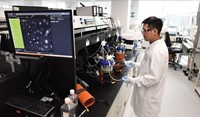Advertisement
Grab your lab coat. Let's get started
Welcome!
Welcome!
Create an account below to get 6 C&EN articles per month, receive newsletters and more - all free.
It seems this is your first time logging in online. Please enter the following information to continue.
As an ACS member you automatically get access to this site. All we need is few more details to create your reading experience.
Not you? Sign in with a different account.
Not you? Sign in with a different account.
ERROR 1
ERROR 1
ERROR 2
ERROR 2
ERROR 2
ERROR 2
ERROR 2
Password and Confirm password must match.
If you have an ACS member number, please enter it here so we can link this account to your membership. (optional)
ERROR 2
ACS values your privacy. By submitting your information, you are gaining access to C&EN and subscribing to our weekly newsletter. We use the information you provide to make your reading experience better, and we will never sell your data to third party members.
Drug Discovery
Roche partners with Arrakis on small molecules that target RNA
Arrakis will earn $190 million in its first pharma partnership
by Ryan Cross
April 8, 2020
| A version of this story appeared in
Volume 98, Issue 14

When a small group of scientists and biotech veterans founded Arrakis Therapeutics in 2015, they knew their plan was borderline crazy. The start-up was built around the theory that scientists could design small molecules that target specific strands of messenger RNA, the genetic code that cells use to make proteins. If they could find a way to inhibit the translation of that mRNA into proteins, they’d have an alternative approach for tackling some of the toughest-to-drug proteins.
Now, Arrakis has its first big pharma partner. Roche is paying Arrakis $190 million in cash to begin developing RNA-targeted small-molecule drugs against multiple diseases across all of Roche’s areas of R&D, which include neuroscience, oncology, and rare diseases.
Arrakis’s approach bucks the decades-old drug discovery wisdom that proteins, with their well defined nooks and crannies, make the best targets for small-molecule drugs. RNA, with a structural rigidity comparable to a wet noodle, has long been deemed too floppy for a small molecule to latch onto in a specific way. Arrakis is one of a number of start-ups trying to prove the conventional wisdom wrong.
“It is a big endorsement,” Arrakis CEO Michael Gilman says of Roche’s investment—and not just of the company but of RNA-targeted small-molecule drug discovery at large. “There is clearly a high level of interest, and I am sure there will be more, because there is no shortage of targets.”
Another start-up in the field, Skyhawk Therapeutics, has also attracted the attention of big pharma. Skyhawk has struck a $74 million partnership with Biogen, a $60 million deal with Celgene, and partnerships with Genentech, Merck & Co., and Takeda Pharmaceutical of undisclosed size.
Skyhawk is looking for drugs that alter RNA splicing, the cellular process in which a long molecule called pre-mRNA is sliced and diced into shorter mRNA molecules—an edited set of instructions that cells use to make proteins. About half of Arrakis’s efforts are focused on drugging RNA splicing, Gilman says, and the other half are on drugging mature mRNA molecules to directly block their translation into proteins. Both Arrakis and Skyhawk have been featured in C&EN’s annual 10 Start-Ups to Watch.
When Arrakis raised its initial $38 million in series A funding in early 2017, its scientists were still trying to understand how to find molecules that can drug RNA, Gilman recalls. “There was a lot to figure out,” he says. Fast-forward to the middle of last year, and the company was “getting hits on every mRNA that we’ve screened.”
“We recognized that the magnitude of the opportunity was enormous, with potentially 100 obvious, high-value targets to go after, and we were never going to do that by ourselves,” Gilman says. Roche, which Arrakis had been in touch with since the 2017 J.P. Morgan Healthcare Conference, was an obvious choice for a partner. The Swiss firm was already developing a small molecule, risdiplam, that alters RNA splicing to treat spinal muscular atrophy. “So they didn’t need a whole lot of convincing that RNA was a valid target,” Gilman says.
Under the agreement with Roche, Arrakis could earn “several billion dollars” in future milestone payments and royalties, although the conditions were not delineated. Details of the collaboration are scant as well. Timelines were not disclosed, nor any specific targets or diseases under investigation.
Similarly, Arrakis has kept most details about its approach to drug discovery under wraps. Gilman previously said the firm is interested in targeting a protein called Myc, which is a transcription factor found at high levels in many cancers. Although many chemists have tried to drug Myc, its slippery structure has eluded them, earning it a top spot on pharma’s list of so-called undruggable proteins.
“Our Myc program is still very much alive,” Gilman says. Overall, the firm’s three most advanced programs are in the hit-to-lead stage, he adds, meaning it could be a while before Arrakis is ready to test compounds in humans. Two of those programs are oncology targets—“which may or may not be Myc,” Gilman says—and the third is for a dyslipidemia, a disease caused by high levels of fat in the blood.
Research at Arrakis, like at many biotech companies, is likely to be delayed by the COVID-19 pandemic.
“We sent our nonlab folks home three weeks ago and then eventually shut down the lab,” Gilman says of the firm’s facility in Waltham, Massachusetts. But most of the start-up’s work is continuing, he says. It works with contract research organizations in China, which have begun to come back online as the virus abates there.
“And lot of our work is computational,” he adds, meaning that scientists can continue some studies from home. “So we are in pretty good shape now, but we are all wondering how long this will go on for.”




Join the conversation
Contact the reporter
Submit a Letter to the Editor for publication
Engage with us on Twitter